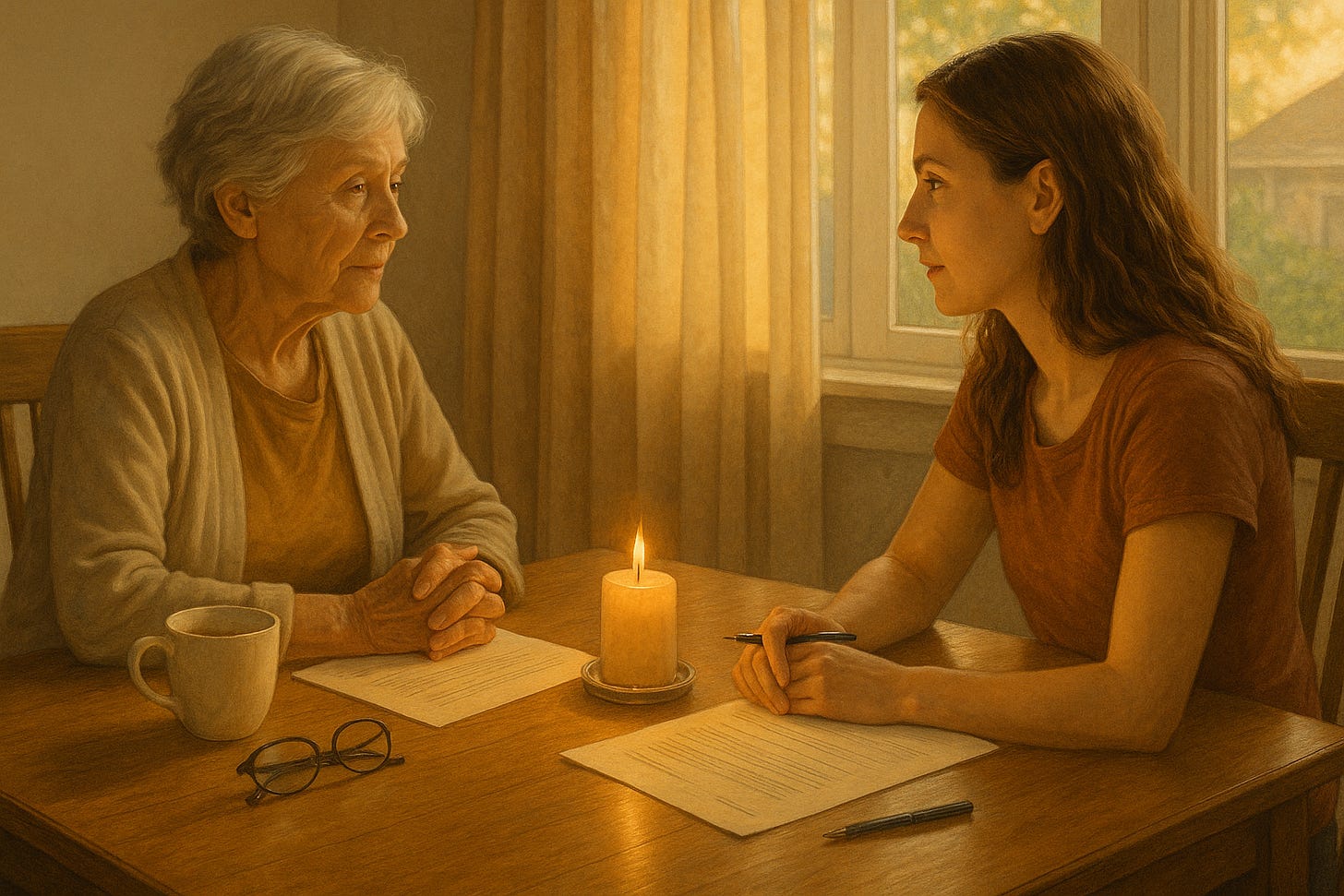What Happens When We Stop Waiting for the Right Time to Talk About Death
How early conversations about end-of-life care can ease the weight later
The room is quiet before it begins.
In grief circles, silence always arrives first. People hold their cups, eyes lowered, waiting for someone else to go first.
When I ask what still lingers after loss, the answers are nearly the same each time.
“I wish I had known what my mom wanted.”
“We argued about everything in the hospital.”
“I don’t know if my husband was in pain.”
No one talks about regrets over the music at the service or the kind of flowers chosen. What hurts most are the questions that never found a voice.
Every time I hold a grief circle, I hear some version of this. Families who loved each other deeply but never had the conversations that could have made their endings easier. They didn’t mean to avoid them. They just kept waiting for the right time.
Yet, there is no right time. There is only time that runs out.
Why we wait
Most people believe that talking about death will invite it closer. They want to protect their families from fear. They want to stay hopeful. Some are afraid of saying the wrong thing. Some simply don’t know where to begin.
Avoidance feels gentle in the moment. It keeps everyone comfortable for a while. Yet it leaves a kind of residue. Decisions pile up later, thick with uncertainty. The weight falls to those who remain.
I have even felt myself collapsing under that weight, replaying every choice we made for our Dad in the days leading up to his death. Even knowing we did the right things, I still often find myself asking whether we should have done things differently. There is a guilt I carry many days, a guilt that doesn’t really belong to me.
Talking about our end-of-life wishes isn’t some morbid thing. It is an act of love. It is how we make sure our people are not left to guess.
What end-of-life care really means
When I speak about end-of-life care, people often think of medical equipment and hospital beds. Those are only small pieces.
End-of-life care is about how a person wants to live when life looks different. It is about comfort, dignity, connection, and control.
It includes choices about pain relief, spiritual or cultural needs, where care should happen, and who can speak when the person cannot. It is also about the mood of a room, the kind of light they want near them, the music that feels like peace.
These seem like tiny details, yet they shape how the final days unfold. And the only way to know them is to ask.
How to begin
If you have never talked about these things before, start small. Choose a calm evening. Turn off distractions. Tell your loved one that you want to understand their wishes so you can honor them.
Begin with something gentle, like:
“What does quality of life mean to you?”
You can ask what comforts them, what they fear, what gives them a sense of peace.
If the moment feels heavy, pause. These talks are not a single event. They are ongoing. You can return to them many times.
When I guide families, I remind them that these conversations are about love, not illness. They are about protecting each other from confusion and guilt later.
Often someone begins to tell stories. Laughter returns. The atmosphere changes from dread to relief.
Once the conversation opens, questions about details become easier:
Who should make decisions if you cannot?
Would you want to stay home or receive care elsewhere?
How do you feel about pain medication or life support?
The goal is not to fill out forms right away. The goal is to understand what peace means to them.
A tool to help you start
To make this easier, I created a free guide called The Ritual of Conversation: 8 Questions to Ask a Loved One About End-of-Life Care. It offers simple language and reflection prompts to guide you through these talks.
You can use it at the kitchen table, during a walk, or after dinner. The questions are written to create understanding, not pressure.
Download the guide here:
Take one question at a time. Listen without rushing to respond. Let the conversation move naturally.
What happens when we talk sooner
When people talk about these things early, I notice the same pattern.
Tension softens. Families become a little lighter. There is less arguing when illness comes. There is less fear in the room.
One family I worked with decided to make their talks a Sunday ritual. They lit a candle, asked one question from the list, and wrote down the answers. When the mother became ill months later, her children already knew her wishes. They still grieved, but they didn’t carry confusion. They could focus on love.
That is what happens when we stop waiting. The conversation itself becomes part of the care.
A small ritual
If you ask even one question this week, take a few minutes afterward to write about how it felt. Notice what surprised you. Notice how your body responded when truth entered the room.
Light a candle for the courage it took to speak. Whisper gratitude for the clarity you now hold.
These moments are not only about dying. They are about living honestly with the people we love.
They are how we make sure no one has to guess later.
The right time is the one that is still available.
Love today,
Heather 🌸


